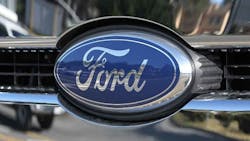Ford Reboots European Strategy With SUVs, Mild Electrification
Ford Motor Co. unveiled its latest effort to boost its loss-making European business, saying it’ll introduce four plug-in hybrids and two battery-powered models in a region where manufacturers face slowing sales and tightening emissions rules.
The U.S. carmaker said Wednesday it will offer a new compact SUV, the Puma, with a mild-hybrid powertrain option. The model, to be built at Ford’s Craiova plant in Romania, will add to an SUV lineup that includes the Explorer and a new Kuga unveiled a day earlier.
The electrification effort, which lags more ambitious plans at rivals Volkswagen AG and Renault SA, comes amid speculation about the U.S. carmaker’s future in the region. Ford, which employs some 54,000 in Europe, last month said it’ll pull out of the Russian car market and close three plants there. Detroit peer General Motors Co. sold its European Opel and Vauxhall brands to Peugeot-maker PSA Group in 2017 after two decades of losses.
“Ford in Europe isn’t going anywhere but forward,” Ford of Europe Chairman Steven Armstrong told reporters Tuesday in Amsterdam. “This is Ford re-engineering itself for an excited connected future and making electrification relevant to millions.”
At the event, Armstrong showed off a revamped version of Ford’s best-selling Kuga, the European twin of the U.S. Escape.
Sticking Around
Declining markets since last year are magnifying spending pressures on carmakers to force costs cuts, increase collaboration with rivals and consider mergers. Ford, which has committed to spending $11 billion by 2022 on electric cars globally, plans to return to profitability with a 6% margin goal for Europe, short of an 8% global target.
The U.S. manufacturer last month said it will cut more than 5,000 staff in Germany, after outlining plans in January that may include closing factories as well as weeding out slower-selling models. Uncertainty over Brexit in Ford’s biggest European market is especially hurting.
Brexit Woes
A U.K. departure from the European Union without an agreement would be a “disaster” for the company and the auto industry, Armstrong said in an interview with Bloomberg Television. Ford is prepared to reconsider its U.K. footprint, counting an engine and a transmission plant, in the event of a no-deal Brexit, he said.
Ford’s presence in Europe has shrunk in the past decade-and-a-half. The carmaker sold Jaguar and Land Rover to Tata Motors Ltd. in 2008 and handed Sweden’s Volvo Cars to China’s Geely Automobile Holdings in 2010. It also sold off its British Aston Martin brand.
The company is also shuttering a transmission plant in France, as part of its review that includes “rescaling the footprint of the business.” Production of the C-Max people mover at Saarlouis in Germany will cease. Ford’s passenger-vehicle business, with a strong lineup of city cars like the Fiesta, has struggled with a lack of popular SUVs. Sales last year declined 3.5 percent to 970,000 cars.
To help generate savings, the Dearborn, Michigan-based company will cooperate with Volkswagen on vans, a profitable business where Ford is the market leader in Europe.
The collaboration could extend to autonomous cars or even sharing production platforms. VW, the world’s biggest car maker, has also said it’s dedicated electric vehicle platform technology was open to competitors in a bid to gain scale and save costs.
Talks to advance the project are “progressing well,” Armstrong said.
By Ellen Proper and Elisabeth Behrmann
About the Author
Bloomberg
Licensed content from Bloomberg, copyright 2016.
